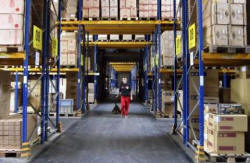|
 Jump
in private consumption helps Germany avoid recession in third quarter Jump
in private consumption helps Germany avoid recession in third quarter
 Send a link to a friend
Send a link to a friend
[November 25, 2014]
By Noah Barkin
BERLIN (Reuters) - A sharp rise in private
consumption more than compensated for stubborn weakness in investment to
help the German economy post modest growth in the third quarter and
avoid a technical recession, data showed on Tuesday.
|
|
 The Federal Statistics Office confirmed an earlier flash estimate
showing a 0.1 percent rise in seasonally-adjusted gross domestic
product (GDP). The Federal Statistics Office confirmed an earlier flash estimate
showing a 0.1 percent rise in seasonally-adjusted gross domestic
product (GDP).
Private consumption rose 0.7 percent quarter-on-quarter, the biggest
increase in three years, and public investment rose 0.6 percent.
Overall consumption contributed 0.5 percentage points to growth,
while trade provided modest support.
On the downside, investment in equipment tumbled by 2.3 percent,
while gross capital and construction investment also fell. Overall,
investment subtracted 0.7 percentage points from GDP growth in the
quarter.
But in a positive sign for the fourth quarter, inventories were a
major drag on growth, suggesting a rebound in the final months of
the year.

"We are not in a recession," Finance Minister Wolfgang Schaeuble
told parliament after the data was released.
"We don't have quite such good economic growth as we did before but
we are performing close to our economic capacity. We can't allow
thoughtless chitchat about a 'crisis' to encourage one."
He defended Chancellor Angela Merkel's "grand coalition" government
against accusations that it is not investing heavily enough in
infrastructure, spending that critics say is vital to help spur
growth in Europe.
After the German economy contracted by 0.1 percent in the second
quarter, some economists had feared it would sink into a technical
recession with another drop in the third, weighed down by weakness
in key euro zone trading partners such as France, a slowdown in
China and uncertainty from the Ukraine crisis.
[to top of second column] |

But Germany managed to eke out some growth and now appears to be
regaining momentum. On Monday, a closely-watched measure of business
sentiment from the Munich-based Ifo think tank rebounded strongly,
helped by a drop in the euro to two-year lows against the dollar and
by a decline in oil prices.
Low unemployment, rising wages and rock-bottom interest rates are
also providing support.
Still, Germany no longer looks like the "growth locomotive" that
defied the euro zone crisis to grow strongly in 2010 and 2011.
(Writing by Noah Barkin; Additional reporting by Stephen Brown and
Erik Kirschbaum; Editing by Kevin Liffey)
[© 2014 Thomson Reuters. All rights
reserved.] Copyright 2014 Reuters. All rights reserved. This material may not be published,
broadcast, rewritten or redistributed.
 |